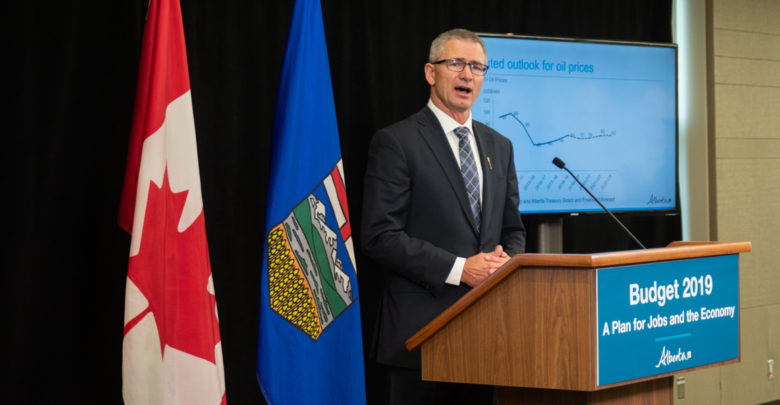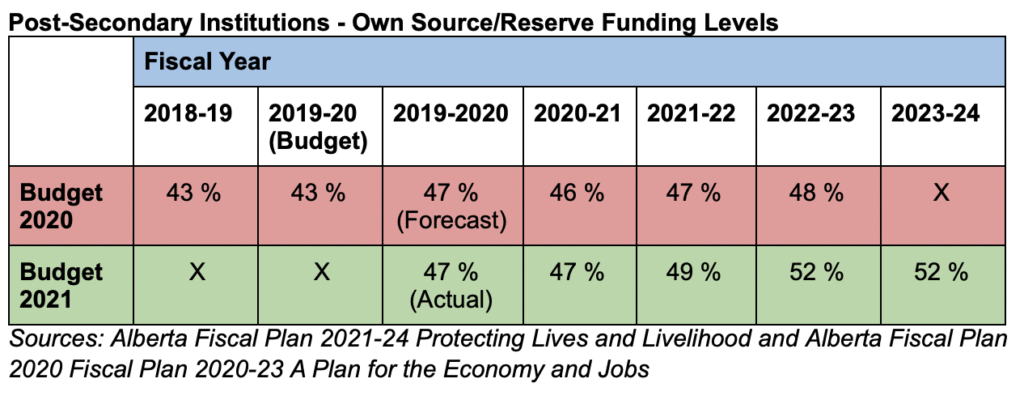BREAKING: Budget 2021’s impact on post-secondary in Alberta
 Tina Tai
Tina TaiUnder Budget 2021, post-secondary institutions will receive less government financial support and student financial aid in the form of grants, scholarships and awards will not increase despite rising tuition.
Unveiled at the Alberta Legislature on February 25, 2021 by Finance Minister Travis Toews, the newest provincial budget will officially implement performance-based funding for post-secondary institutions in Alberta, more money for research internships, a decrease in operational funding, shed jobs within the sector, among other impacts.
After facing the “deepest global economic contraction since the Great Depression,” Alberta’s provincial deficit will grow to $18.2 billion in 2021-22 — a figure $3.1 billion lower than estimated projections in November of last year. Budget 2021 will also serve as the province’s third quarter fiscal update.
Performance-based metrics to be formally implemented, with specific metrics to be released within the week
After having been announced last year and delayed due to the COVID-19 pandemic, performance-based funding will be set into motion.
According to government officials, Minister of Advanced Education Demeotrios Nicolaides will discuss individual institutions investment management agreements and how performance-based funding will affect their respective institution later next week. The substance within the investment management agreements is still being determined by the province.
Operational funding under Budget 2021 to post-secondary institutions decreasing by $135 million
Budget 2021 estimates that operation expense funding will decrease between 2021-22 by $135 million.
The government estimates that post-secondary institutions will spend $50 million more on operational expenses this year compared to 2020-21.
Individual operating and program support grant cuts to institutions will be communicated to post-secondaries by the minister. No timeline was given for when these would be communicated.
U of A facility to receive funding as part of COVID-19 response and economic recovery plan
The Li Ka Shing Applied Virology Institute at the University of Alberta will receive $20 million in government funding over the next four years.
According to the province’s fiscal plan, the funding will help “accelerate leading-edge research and commercialization of pharmaceutical and vaccine treatments.”
The funding is being provided as part of the province’s 2021-22 $3.1 billion COVID-19 response and economic recovery plan.
More money for student research internships provided in Budget 2021
Also part of the COVID-19 response and recovery plan is providing $5 million in additional funding to create more student research internships for Alberta students through the partnership with Mitacs International. This is on top of a $5 million investment in October of 2020.
Government support for post-secondary decreasing at accelerated pace than projected before
Budget 2021 is accelerating the amounts post-secondary institutions will be expected to fund by own-source revenue. Under last year’s budget, institutions were expected by 2022-23 to fund 48 per cent — translating to an approximate $100 million loss a year for government support to post-secondary education.
Under the newest budget, 2019-20 had post-secondaries fund 47 per cent of their funding through their own sources of income. The government is estimating post-secondary institutions in 2021-22 will have to fund 49 per cent of their operations themselves, with the amount increasing to 52 per cent the following year.

Student grants, scholarships, and awards frozen with no adjustments to inflation
Alberta Student Aid grants, scholarships and awards funding levels will remain frozen from their 2020-21 levels with no increase to even account for inflation.
$54.7 million in Student Aid grants and $51.8 million in scholarships and awards was awarded in 2020-21. These allocations will remain the same for 2021-22.
Tuition revenue less than government anticipated in Budget 2020, despite increases to tuition fees
According to the government’s fiscal plan, revenue generated by post-secondary tuition in 2020-21 has declined by $91 million or 6.23 per cent, compared to the revenue generated by tuition in 2019-20. This reduction of revenue occurred despite increases in tuition fees for students, such as the seven per cent increase in tuition fees for domestic students at the University of Alberta for the 2020-21 academic year.
The fiscal plan refers to the MacKinnon Panel recommendation to post-secondary institutions to “explore broader revenue streams to reduce reliance on the government, including asking students to pay a higher proportion of their post-secondary education.”
The government estimates that revenue generated by tuition fees will increase over the next three years, estimating that revenue generated by tuition will increase yearly by “an average of 5.6 per cent.”
Within Budget 2019, the government instituted a cap on tuition fee increases for domestic students until 2022-23, at seven per cent. Budget 2021 made no mention of if the current legislated cap would continue beyond 2022-23 despite making revenue projections that tuition revenues would increase in Alberta.
750 jobs lost at post-secondary institutions in 2021-22
Budget 2021 revealed that 750 jobs within the post-secondary sector have been lost already or are slated to be removed through attrition or layoffs.
The exact breakdown of where those positions were lost was not provided as government officials said it is up to individual institutions on how best to respond to “restructuring cost-structures.”
Finance and Fintech research partnership formed with University of Calgary
As part of Alberta’s economic recovery plan, a new research partnership exploring finance and financial technology (fintech) will be created between the University of Calgary and the Government of Alberta.
The partnership will “help inform policy decisions on industry development and other key financial sector issues.”
The province’s fiscal plan outlined that while the University of Calgary has partnered with the government for this initiative other “interested institutions” could join.
Budget 2021 has capital investments increase but capital maintenance and renewal projects decline
Overall capital investment in advanced education will increase in Budget 2021-22 by $97 million. Capital maintenance and renewal (CMR) funding — used to maintain existing infrastructure and address deferred maintenance — will decrease over the next three years. In 2021-22, $151 million will be allocated for the entire post-secondary sector. That amount will drop by $64 million in the following year to a forecasted allocation of $87 million.
The U of A’s ongoing Dentistry-Pharmacy Building renewal project will receive $44 million in 2021-22 and $56 million in 2022-23 after which the project is expected to be completed.
The U of A also secured $2 million in one-time funding to address maintenance of its District Energy System and $12 million over two years for capital upgrades of its U of A Hospital Brain Centre Neurosciences Intensive Care Unit.




